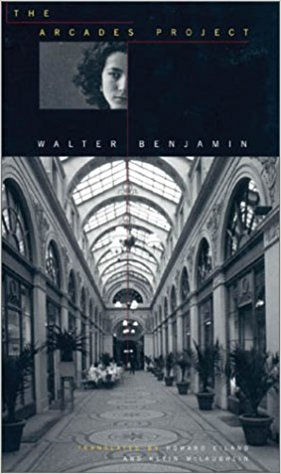|
The Arcades Project by Walter Benjamin
(Special at Paris Bookshop)
Intellectual Masterwork by Jewish Scholar & Holocaust Victim
Read More (below) or Click Cover at Right for Amazon
 The Arcades Project by Walter Benjamin The Arcades Project by Walter Benjamin
Walter Benjamin (1892-1940) [Wikipedia link] was a Renaissance man born in Germany who emigrated to France and, in 1927, began his monumental study of 19th Century Paris, titled Das Passagenwerk or in English, The Arcades Project. The Arcades, starting to appear in the early 1800s, were covered streets protected by glass and new building material (iron, leading ultimately to the Eiffel Tower of 1889). With gaslights, metro lines, and passages, Paris was transformed into the science-fiction capital of a new world.
A dramatic and romantic innovation at the time, we might recognize their descendants as covered shopping malls today but that doesn't capture the immense, symphonic movement of their dream in a society barely reaching the age of gaslights and early tramways. That is the powerful impetus that propelled Walter Benjamin to endeavor to comprehend the brave new world of the 19th Century, which tragically created the nightmare of his own early 20th Century, replete with industrial slaughter (World War I) and a veritable populism-driven Götterdämmerung presided over by diabolical demagogues like Hitler and Mussolini.
Benjamin, as a refuge trying to escape (ironic: passage) from Nazi-occupied Germany, perished mysteriously in a Spanish border down in 1940 at age 58. He left behind his most prized possession that he was carrying with him: a briefcase containing major portions of this magnum opus.
The passages of Paris (those that remain today) are, in their own way, part of the architectural and cultural glory of Paris. They mark a step forward in urban life, within the penumbra of the Industrial Revolution and all of its effects. We see their equivalents in many great cities of the age including the famous Italian galerias (e.g., Vittorio Emanuele in Milan (built 1865-1877, dedicated to the king of a finally unified Italy). Walter Benjamin's genius lay in a systematic approach to capturing the universal connections of his world, which his vision found telescoped in these passageways of infinite dreams and possibilities. The Passagenwerke are an unfinished symphony.—Jean-Thomas Cullen, San Diego, 2017.
"To great writers," Walter Benjamin once wrote, "finished works weigh lighter than those fragments on which they labor their entire lives." Conceived in Paris in 1927 and still in progress when Benjamin fled the Occupation in 1940, The Arcades Project (in German, Das Passagen-Werk) is a monumental ruin, meticulously constructed over the course of thirteen years--"the theater," as Benjamin called it, "of all my struggles and all my ideas."
Focusing on the arcades of nineteenth-century Paris-glass-roofed rows of shops that were early centers of consumerism--Benjamin presents a montage of quotations from, and reflections on, hundreds of published sources, arranging them in thirty-six categories with descriptive rubrics such as "Fashion," "Boredom," "Dream City," "Photography," "Catacombs," "Advertising," "Prostitution," "Baudelaire," and "Theory of Progress." His central preoccupation is what he calls the commodification of things--a process in which he locates the decisive shift to the modern age.
The Arcades Project is Benjamin's effort to represent and to critique the bourgeois experience of nineteenth-century history, and, in so doing, to liberate the suppressed "true history" that underlay the ideological mask. In the bustling, cluttered arcades, street and interior merge and historical time is broken up into kaleidoscopic distractions and displays of ephemera. Here, at a distance from what is normally meant by "progress," Benjamin finds the lost time(s) embedded in the spaces of things.

|
 
Reviews
A Growing Body of Appreciation. The reviews of this great work are too many to comfortably reproduce here. Rather, if you are interested, begin by reading the commentaries from many leading modern critics at Amazon.com's Walter Benjamin page, among other resources on line.
Not Instant Gratification (By Lightyears). As a final note from me (Jean-Thomas Cullen) please understand that this is not a work to be read in one sitting, nor even sequentially. I have owned my copy for over two years, and regularly read a paragraph or a page from it, and am still absorbing and digesting what I can. I find it breath-taking in its courage and the scope of its vision.
TOP | MAIN
|

